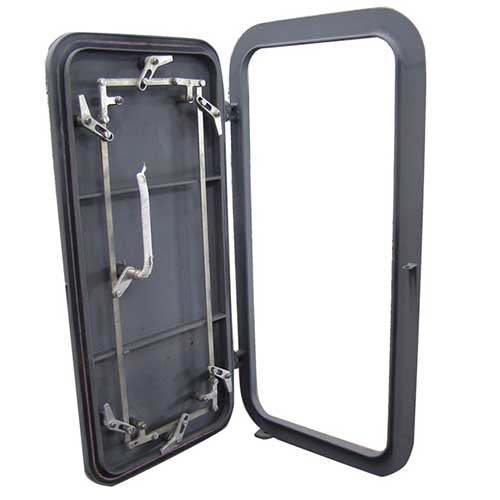How to Design Marine Watertight Doors
Securing vessels from potential threats in the maritime industry is of utmost importance, where safety is a paramount concern. Among the critical components ensuring safety and integrity at sea are marine watertight doors. These doors are specifically designed to resist water penetration during emergencies or severe conditions. This article delves into the design concepts that contribute to the success of marine watertight doors.
Purpose and Importance of Marine Watertight Doors
Watertight doors strategically placed throughout a ship are intended to compartmentalize it. Their primary purpose is to contain flooding in case of damage while maintaining the buoyancy and stability of the vessel. These marine doors act as barriers, limiting the movement of water and averting catastrophic consequences in emergencies.

Key Considerations and Design Principles of Marine Watertight Doors
Marine watertight door design requires a blend of engineering expertise, adherence to safety regulations, and a deep understanding of the challenging marine environment.
Material Selection:
Corrosion Resistance: Marine settings are corrosive due to saltwater exposure. Choosing corrosion-resistant materials like marine-grade stainless steel or aluminum alloys ensures longevity and structural integrity.
Durability: Selected materials must endure physical loads and impacts during routine and emergency operations.
Sealing Mechanisms:
Compression Gaskets: Forming a tight seal when closed, compression gaskets prevent water infiltration. Tough materials retain their effectiveness even under high pressure.
Inflatable Seals: Advanced designs may incorporate inflatable seals that adjust to different pressures, adding an extra layer of protection.
Hinges and Locking Systems:
Heavy-Duty Hinges: Frequent opening and closing necessitate heavy-duty hinges for durability, longevity, and optimum alignment.
Secure Locking Mechanisms: Reliable and secure locking mechanisms prevent unintended door openings during normal or emergency operations.
Testing and Certification:
Rigorous Testing: Doors undergo rigorous testing simulating real-world conditions such as high-pressure water flow and shifting sea states.
Certification Compliance: Adherence to international norms, such as those defined by the International Maritime Organization (IMO), confirms doors meet safety and performance criteria.

Design for Easy Operation:
Ergonomics: Consideration for ease of operation is crucial, especially during emergencies where quick and efficient closure is vital.
Accessibility: Designing doors to be easily accessible and operable by the crew ensures effective response, considering factors like size, weight, and manual or automated operation.
Integration with Automation:
Remote Monitoring and Control: Automation technologies enable real-time monitoring and control, allowing quick responses to emergency situations and enhancing operational efficiency.
Maintenance Protocols:
Regular Inspection: Scheduled inspections and maintenance protocols identify and address issues promptly.
Training: Proper training of crew members on maintenance procedures and emergency protocols ensures effective functioning when needed.
Environmental Considerations:
Temperature Variations: Doors should endure frequent temperature fluctuations without compromising sealing capabilities.
UV Resistance: If exposed to sunlight, considering UV-resistant coatings or materials prevents deterioration over time.
Conclusion
Watertight design for marine doors is indispensable for maritime safety, acting as the first line of defense against potential flooding. Watertight doors, through meticulous material selection, rigorous testing, and modern sealing technology, play a crucial role in ensuring the safety and resilience of vessels at sea. The ongoing commitment to watertight door design remains vital to the overall safety and security of seafaring vessels and their crew as the maritime sector continues to evolve.
- Art
- Causes
- Crafts
- Dance
- Drinks
- Film
- Fitness
- Food
- Spellen
- Gardening
- Health
- Home
- Literature
- Music
- Networking
- Other
- Party
- Religion
- Shopping
- Sports
- Theater
- Wellness


